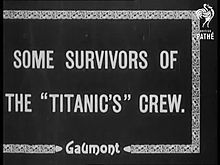The Loss of the Titanic - 15 April 1912 - over 1,500 Souls lost #maritimehistory
- ASKET Broking team
- Apr 17, 2018
- 2 min read
RMS Titanic was a British passenger liner that sank in the North Atlantic Ocean in the early morning of 15 April 1912, after colliding with an iceberg during her maiden voyage from Southampton to New York City.

Of the 2,224 passengers and crew aboard, more than 1,500 died, making it one of the deadliest commercial peacetime maritime disasters in modern history.
The largest ship afloat at the time it entered service, the RMS Titanic was the second of three Olympic class ocean liners operated by the White Star Line, and was built by the Harland and Wolff shipyard in Belfast. Thomas Andrews, her architect, died in the disaster.
Under the command of Edward Smith, who went down with the ship, Titanic carried some of the wealthiest people in the world, as well as hundreds of emigrants from Great Britain and Ireland, Scandinavia and elsewhere throughout Europe seeking a new life in North America.
Although Titanic had advanced safety features such as watertight compartments and remotely activated watertight doors, there were not enough lifeboats to accommodate all of those aboard due to outdated maritime safety regulations. Titanic only carried enough lifeboats for 1,178 people—slightly more than half of the number on board, and one third of her total capacity.

On 14 April, four days into the crossing and about 375 miles (600 km) south of Newfoundland, she hit an iceberg at 11:40 p.m. ship's time. The collision caused the ship's hull plates to buckle inwards along her starboard (right) side and opened five of her sixteen watertight compartments to the sea; she could only survive four flooding
At 2:20 a.m., she broke apart and foundered—with well over one thousand people still aboard. Just under two hours after Titanic sank, the Cunard liner RMS Carpathia arrived at the scene, where she brought aboard an estimated 705 survivors.
Image: The sinking, according to J. Thayer, sketched onboard Carpathia, based on his description
One of their most important legacies was the establishment in 1914 of the International Convention for the Safety of Life at Sea (SOLAS), which still governs maritime safety today. Additionally, several new wireless regulations were passed around the world in an effort to learn from the many missteps in wireless communications—which could have saved many more passengers.
Read more here - Wikipedia





Comments